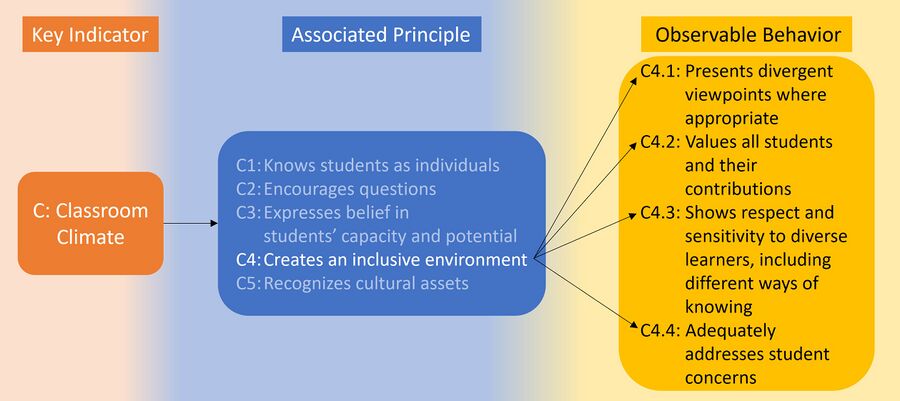Peer Observation: Difference between revisions
From The Eco-STEM Wiki
No edit summary |
No edit summary |
||
| Line 5: | Line 5: | ||
The process is built around the three key aspects, Climate, Structure, and Vibrancy. Each of these aspects has five associated principles, which in turn has associated behaviors that can be observed in a classroom. The image below shows an example of classroom climate. | The process is built around the three key aspects, Climate, Structure, and Vibrancy. Each of these aspects has five associated principles, which in turn has associated behaviors that can be observed in a classroom. The image below shows an example of classroom climate. | ||
[[File:Peerobservation structure.jpg|alt=Peer Observation structure|center|thumb|900x900px|Example of a Key Indicator, its Associated Principles, and Observable Behavior for one of the principles.]] | [[File:Peerobservation structure.jpg|alt=Peer Observation structure|center|thumb|900x900px|Example of a Key Indicator, its Associated Principles, and Observable Behavior for one of the principles.]] | ||
A summary of the principles and behaviors can be found in the ''' | A summary of the principles and behaviors can be found in the '''[Peer_Observation_Tool_-_Condensed.pdf|summary version of the observation tool]'''. | ||
Revision as of 12:10, 10 August 2022
Eco-STEM Peer Observation Process
The main goal of the peer observation is to give feedback on the actual learning environment in the classroom and for the observed instructor to engage in a reflective process on their teaching.
The process is built around the three key aspects, Climate, Structure, and Vibrancy. Each of these aspects has five associated principles, which in turn has associated behaviors that can be observed in a classroom. The image below shows an example of classroom climate.
A summary of the principles and behaviors can be found in the [Peer_Observation_Tool_-_Condensed.pdf|summary version of the observation tool].
